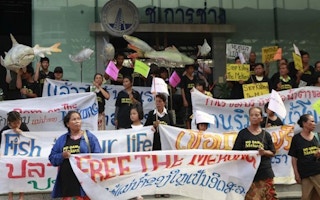Protests over construction of the controversial Xayaburi hydro dam project in northern Laos could spread from Thailand to Cambodia as communities along the Mekong River begin to feel its negative effects, an International Rivers programme director said yesterday.
About 70 Thai villagers who rely on the Mekong River for their livelihoods rallied outside the offices of developer Ch.Karnchang in Bangkok on Tuesday.
The protest came after the company announced last week it had signed a construction deal with Xayaburi Power Company to build the 1,260-megawatt dam, the first of its kind on the Lower Mekong River.
Ch.Karnchang, which said construction began on March 15, owns 30 per cent of Xayaburi Power Company.
“We are calling for Ch.Karnchang to immediately suspend the Xayaburi construction until the commission’s study is completed,” the protesters said in a statement.
Ame Trandem, Southeast Asia programme director at International Rivers, said sources had told her Ch.Karnchang has already hired as many as 5,000 construction workers on three-year contracts.
“It sounds like construction has started on the dam itself. This is essentially a violation of the 1995 agreement, because the four countries [Cambodia, Laos, Thailand and Vietnam] are yet to agree,” she said.
Under this agreement, Mekong River Commission [MRC] countries must consult one another on projects that could affect other members.
“If construction continues, people will feel the impact… you are changing the ecosystem of the river. There will be fewer fish … communities will suffer.
“Given it will affect their livelihoods … [Cambodians] will definitely join the protests.”
Protesters at Tuesday’s demonstration, which coincided with Ch.Karnchang’s shareholders’ meeting, complained the company was contravening another MRC agreement made in December that an environmental impact study was needed before the project could begin.
Te Navuth, secretary-general of the Cambodia National Mekong Committee, told the Post on Monday that Japan had agreed to fund this study.
Surasak Glahan, communications officer for the Mekong River Commission secretariat, said member countries were still discussing “scope, timelines and methodology” for the study, as it involved other MRC development partners.
“All four member countries are still showing their commitment to further study by participating in discussion on the matter,” he said, adding that the issue of Cambodia launching legal action if Laos proceeded had not been raised.
Surasak Glahan said the Lao government had still not told him whether construction on the dam had begun.
Marc Goichot, the WWF’s sustainable hydropower manager for the Greater Mekong region, said the MRC needed to take it a step further.
“WWF would like to recommend that a group of representatives from the MRC council is appointed to visit the dam site to observe and monitor,” he said. “It is clear construction workers are present at the site.”
Ch.Karnchang CEO Plew Trivisvavet told the Bangkok Post the project would have “limited environmental impact”.
“All concerns regarding the environment were taken into account in the project’s design and environmental study,” he said.










